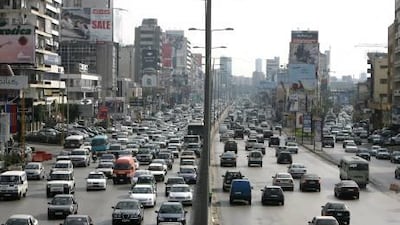BEIRUT // Whether it is the east-west "Damascus line" or the north-south coastal "Autostrade", if you are in a car during rush hour in Beirut, you can sympathise with those Lebanese who say in despair that the country is going nowhere. About 60 per cent of Lebanon's 2.4 million people live along the coast, and an estimated 500,000 of them make a torturous daily commute into and out of the capital. Inside Beirut, the pre-car planning of the streets struggles to accommodate the city's growing number of vehicles, and gridlock is an increasingly common reality for any Beiruti trying to get from A to B.
Bliss Street, in the city's bustling Hamra district, is an animated drag of food stalls on one side and the verdant American University of Beirut campus on the other. The street is, at several points during the day, a clear example of Lebanon's transport woes. Orchestral honking, a cacophony of radio stations, road rage, chain-smoking taxi drivers, and opportunistic scooter riders form the thick, noisy fabric that is modern Lebanese immobility.
But every few years, before a new layer of asphalt is applied to Bliss Street, signs of a different time, of Lebanon's erstwhile public transportation prowess, peek through the worn surface - tram lines.
Elsewhere, in the industrial, largely Armenian, neighbourhood of Bourj Hammoud, vintage train engines sit on rusted tracks that once extended as far south as Haifa, in present-day Israel, and north to Istanbul and beyond to Europe. By building the railway network in the late 1800s followed by an extensive tram network in Beirut in the early 1900s, the Ottomans created a public transport system that was by far the most developed in the region, boosting Lebanon's status as the merchant gateway between East and West.
But along came the car and the lorry. By the late 1960s Lebanon had decommissioned its rail network and tarred over Beirut's tramlines. Today, Lebanese commuters are paying the price with journeys up to three times longer than they once were.
Transport experts and others seeking solutions to this predicament are faced with obstacles.
With a national debt of US$55 billion (Dh183.6bn) one of the largest per capita public debt rates in the world, enormous publicly funded projects are not feasible in Lebanon. The search for cost-effective solutions has led the minister of economy and trade, Mohammed Safari, back to square one - to the rail infrastructure of the Ottoman period.
While it is rusted and overgrown, much of the disused rail network still exists and, more importantly, the land on which it sits is technically government property. Lebanon's cabinet has endorsed Mr Safadi's proposal for a revived rail system, and the Lebanese army is currently undertaking a feasibility study of the disused railroad.
"As Lebanon is a small country, the railway will allow, after time, for Lebanon to become one single market from south to north and east to west," says Antoine Constantine, an adviser to Mr Safari. "It will enable the decentralisation of industry, which is currently clustered around Beirut, and it will spread a much larger economic power to the rest of the country."
A restored rail system would benefit not only commuters and the economy, but also Lebanon's politics, advocates say. In a country where sectarianism is raw and precarious, linking previously cut off neighbourhoods and people would diminish tensions. But this is where the project will fail, observers claim.
Significant tracts of the line have been built over illegally since it was put out of commission and while the government can reappropriate the land, many politicians or their cronies have business interests in the numerous coastal resorts that sit on the line. In Lebanon's cautious system of consensus politics, such interests have a habit of scuttling the kind of legislation that Mr Safadi's project requires.
To avoid the entanglement of politics and private business on land, many public transport strategists are looking to solve the transportation problem offshore.
"Only our sea will rescue us from traffic congestion," says Khaled Taki, president of the Arab Franchise Association.
When many of his staff began to resign because of their untenable commutes, Mr Taki took action. Inspired by water transport systems in London and New York, he designed a water shuttle service, called Beirut Water Taxi, proposing to connect Beirut with seven coastal cities. He said the service would slash by two-thirds the commute by road. The legislation to implement his proposal has been tabled in parliament by the Future Bloc, headed by Saad Hariri, the prime minister.
Mr Taki may not have much experience in sea transport, but his expertise in franchising helped him devise a solution palatable for a cash-strapped government. The fleet of boats required and the minibuses feeding the terminals will cost $25 million in the initial stage, and will be funded by private investors, which, he says, are all lined up.
To tackle the cost of the terminal infrastructures - another $25 million - Mr Taki decided that the terminals would need to be commercialised. Each terminal will effectively be a mall, run by a franchisor who sublets space for commercial use.
His project might never happen, as the public transport landscape in Lebanon is strewn with failed projects akin to Mr Taki's and the transport minister's. The maritime transport law designed to enable the Beirut Water Taxi project was drafted months ago and is nowhere near tabling.
Lebanon's political establishment is mired in the deepening political crisis over the United Nations Special Tribunal charged with prosecuting the killers of the former prime minister Rafiq Hariri, who was assassinated in 2005. Some fear the situation could lead to another civil war. Meanwhile, public works projects stagnate and the patience of investors frays.

